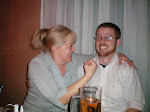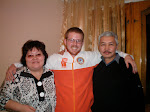Spanish Class
About a month ago I started teaching a weekly one-hour Spanish class for free at the public library. I have had fairly consistent attendance, with about 10-15 students each time. The students that participate are almost all the same ones that attend our public English Club, about half of which are university students. I’ve had a blast making up my own curriculum with free online resources, quizzes and grammar explanations. Every class I am struggling to remember all the Spanish that I’ve lost in the last 9 months from lack of use and a great influx of Russian vocabulary and grammar. I guess I can’t complain, as Spanish is already a fourth, fifth, or even sixth language for some of the students I’m teaching. I teach the class in Russian-speckled English, meaning that it really is a multi-lingual experience for the students and “Señor Felipe.” All my students are highly motivated to participate and to learn, something I rarely experience in the school classroom, but which is so refreshing to see. At the end of each class I leave, thinking to myself that only in the Peace Corps would I find an opportunity to teach Spanish, in English, to a bunch of Russian and Kazakh native speakers.
Beshkul
Last weekend we had another random act of gosti-ing. “Gost” is the Russian word for guest, and “to gosti” is a verb central to the culture here. It is fairly common, I’ve noticed, to show up unannounced and unexpected at a friend’s house and demand tea and cookies. It is an unspoken rule that you are expected to bring a gift (tea, cookies, vodka, wine, cake, juice, etc) to contribute, and that you will always be admitted. A cup or two of tea, a box of cookies, and an hour of conversation later, and you can be on your way to the next store to buy the next box of tea for the next friend on your list. This cultural practice of tea-consumption and gift giving is a bit strange for us Americans here, and sometimes works against us if we want to just meet at someone’s house to then go somewhere else. If, for example, Mike comes to my house on our way to the library, and my host mom is home, she will make tea and set the table regardless of how much you explain that you are late and must get going. We’ve found that we have three options: 1.) Refuse the tea being prepared or already sitting on the table and promise to come just for tea some other time. 2.) Meet outside at a certain time so that the host mom and potential gost don’t meet, effectively by-passing the danger of tea-overkill. 3.) Drink the tea. Eat the cookies. Smile. Try to speak Russian. Put off worrying about the long term effects of a high-caffeine and high-sugar diet until a later point in life. Now, option one and two both create minor problems, as refusing tea on the table is rude, and avoiding the house because of tea is just plain silly. It means that we drink a lot of tea and eat pounds and pounds of sugar over an extended period of time. This is all to provide some background for the story of Ashley, a PCV in Beshkul, a village 12 minutes away from Petro, who invited us to see her town.
The four Petro PCVs and Tim from Yavlenka gladly accepted the invitation and were looking forward to an afternoon away from site. We have grown accustomed to what we should expect, and we were all prepared with small gifts in hand to bestow upon Ashley’s Kazakh host mom. Mike brought tea, Tim brought wine, and I brought Reese’s Pieces in carrot-shaped bag, which I had been saving since Easter for a special occasion. However, in all our months of preparation and cultural acclimatization, we were blindsided by table of food awaiting us when Ashley’s mom led us to the dining room. Roasted chickens, juice, wine, peroshkis filled with egg and potato, three kinds of salad, flat pancakes, pelmeni, and bread covered every available inch on the table. Our meager gifts were put to shame as we gaped at the table and were ushered to our seats. Ashley leaned over to me and said, “I’m glad you finally came, she’s been cooking since 8am and I was getting worried you’d not make it.” We ate and ate and ate. We did our best to show appreciation through substantial appetites and culinary compliments, but the food keep on coming and our host kept on saying how much better the food could have been if she had just added this or that. Once the packed discomfort in our stomachs grew into actual pain, we drank tea and tried to adjust our sitting positions and our belts to find a vacant corner to fit one more cookie. Afterwards, we sat on her sofa and living room floor, groaning in painful pleasure, talking about how wonderful the meal was and how we wouldn’t need to eat for at least a week after that feast. As I stretched out on the couch and felt my insides cry out, I decided next time that we should come unannounced.
Subscribe to:
Post Comments (Atom)
.jpg)








No comments:
Post a Comment